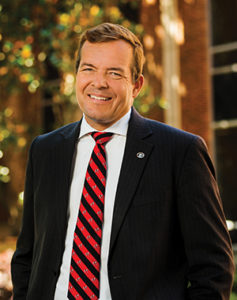 This spring, U.S. News & World Report ranked the School of Law #20 in the nation – its highest ranking in history, #1 in Georgia for the third straight year and the #7 public law school in the country.
This spring, U.S. News & World Report ranked the School of Law #20 in the nation – its highest ranking in history, #1 in Georgia for the third straight year and the #7 public law school in the country.
Reactions have been effusive. Applicants and yields spiked. Employer interviews rose. Alumni/alumnae support flowed. Student pride surged.
Despite the reactions, I’ve always had an uncomfortable relationship with those rankings (or any other). A mentor once advised me to “let Georgia be Georgia.” Put another way, ignore the rankings at your peril but, at the same time, do not allow them to define the school’s values. Thus, my practice has been to view each ranking as but one proof point.
A generation ago, several public law schools embarked on a strategy to be counted among the upper echelon of law schools in the nation. They raised tuition to be indistinguishable from that typical of an elite private institution. Flush with resources, they poured funding into initiatives, ranging from fancy centers to professors’ salaries. By some measures, they succeeded. Their applicant pools expanded, as did their employer markets. They rose in the national rankings. Their recipe for success: “Charge More. Spend More.”
That model is broken. Most centrally, the addiction to never-ending tuition increases created an affordability and accessibility barrier for many applicants and their families. Tuition inflation intersected with restructuring in the legal industry following the Great Recession, eventually leaving a group of graduates over leveraged and underemployed.
Your law school resisted that model thanks to the efforts of strong deans and alumni/alumnae leaders who created a solid foundation: a great education at a good value aimed at well-rounded students with tremendous leadership potential. Over the past decade, with your generous support, the School of Law’s leadership team has built on this foundation.
Our vision – redefining what it means to be a great national public law school – rejects the one pursued a generation ago. We reject the notion that a great education must be a financially inaccessible one. We reject the notion that world-class researchers are incompatible with dedicated teachers. We reject the notion that every new idea must be paid for on the backs of students. We reject the notion that a student’s problem is someone else’s; rather, true to the Bulldog spirit, we never leave a student on the field.
This magazine illustrates our execution of this vision. It begins with holding the line on tuition increases. This provides students the freedom to pursue their professional ambitions based on their passions, not their wallets. Your support, coupled with generous support from President Jere Morehead (J.D.’80) and the UGA Foundation, chaired from 2021-23 by 1987 alum Neal Quirk, has helped make this possible. Today, nearly half of School of Law students obtain their legal education debt free. Support for summer fellowships, professional development attire, bar preparation and now debt relief (thanks to the LSAC under the leadership of 2022-23 President Brian Cain (J.D.’87)) all help ensure that a great legal education at your law school remains accessible. Graduates can follow in the footsteps of great alumni/alumnae leaders or the 20+ judges who visited campus during this past year, including 1987 alum and U.S. District Judge Steve Jones who delivered the commencement address.
Our vision extends beyond pricing and donations. It includes faculty excellence reflected in world-class thought leadership from scholars like Brumby Distinguished Professor Sonja West and Assistant Professor Adam Orford. It embraces partnerships with foundations and donors that support initiatives like PAWS (our cover story), the First Amendment Clinic, the Wilbanks CEASE Clinic, the Jane W. Wilson Family Justice Clinic, the Veterans Legal Clinic or, our newest addition, the Land Conservation Clinic.
Instructional innovation parallels faculty excellence. Under the leadership of Hosch Professor Logan Sawyer, the law school launched an undergraduate minor, which has rapidly grown to one of the largest minors at UGA. Graduate programs likewise are growing, whether a talented class of foreign-trained lawyers, including three Ukrainian students, students in our new Graduate Certificate in International Law or students in our new ADR program. These offerings create valuable pipelines to the profession and new ways to harness the school’s strengths.
Graduates embody our success. Approximately 170 J.D. candidates crossed the stage in May. For many, it marked the culmination of professional studies commenced during the height of the pandemic. Despite the challenges, virtually all received their diploma with a job offer in hand and beamed with pride about graduating from a Top-20 law school.
As the Class of 2023 prepared to begin their professional journey, I assured them that we would always be there for them at every step, saying: “It is my sincere wish that we have equipped you with the skills and confidence to conquer the world. In return, you give us an abiding hope for its future.”
Hasn’t this always been the essential covenant of higher education? When worries abound over whether schools are honoring that covenant, yours represents a model of what higher education can (and ought to) be. Together, let’s redefine what it means to be a great national public law school.
